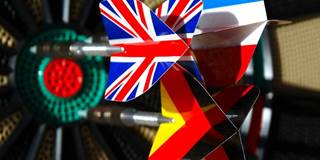In the last two years, Germany has adopted leadership roles regarding the conflict in Ukraine, the civil war in Syria, and the refugee crisis. While this is a welcome development, German leaders must bear in mind that their country's EU membership remains its most potent source of power.
BERLIN – In the two years since Germany’s president, foreign minister, and defense minister signaled that their country would take on a larger role in international affairs, the country’s leaders have received a crash course in geopolitical realism. The challenges Germany has had to face include Russia’s annexation of Crimea, the conflict in eastern Ukraine, the explosion of Syria, terrorist attacks in Europe, and an unprecedented influx of refugees.
These crises have greatly increased Germany’s international profile. And yet the country’s reemergence as a major player on the world stage must be tempered with the recognition that its power depends on cooperation with its partners and the development of a strong, unified European foreign and security policy.
Germany’s embrace of a more active global role has taken place within a rapidly changing geopolitical landscape – one in which German and other European leaders have had to accept that most of the rest of the world does not share their preference for multilateral decision-making. They have also had to come to terms with the fact that the United States is no longer prepared to take the lead in every crisis, and that rising global powers – such as China, India, and Brazil – are not yet prepared to contribute effectively to maintaining a stable global order.

BERLIN – In the two years since Germany’s president, foreign minister, and defense minister signaled that their country would take on a larger role in international affairs, the country’s leaders have received a crash course in geopolitical realism. The challenges Germany has had to face include Russia’s annexation of Crimea, the conflict in eastern Ukraine, the explosion of Syria, terrorist attacks in Europe, and an unprecedented influx of refugees.
These crises have greatly increased Germany’s international profile. And yet the country’s reemergence as a major player on the world stage must be tempered with the recognition that its power depends on cooperation with its partners and the development of a strong, unified European foreign and security policy.
Germany’s embrace of a more active global role has taken place within a rapidly changing geopolitical landscape – one in which German and other European leaders have had to accept that most of the rest of the world does not share their preference for multilateral decision-making. They have also had to come to terms with the fact that the United States is no longer prepared to take the lead in every crisis, and that rising global powers – such as China, India, and Brazil – are not yet prepared to contribute effectively to maintaining a stable global order.